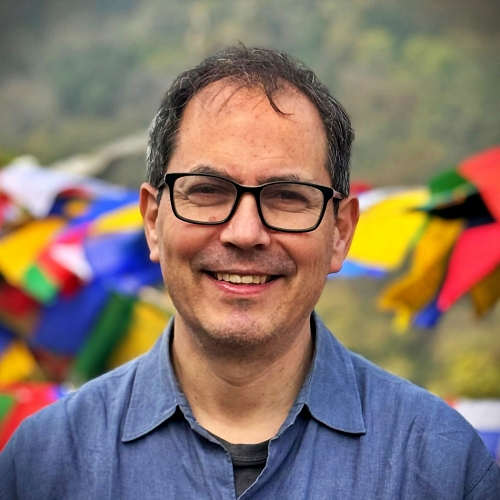Over many centuries of living together, in South and Central Asia, Buddhists and Muslims often found themselves in dialogue, learning and growing from their encounter with each other. They shared the view that the nature of uncreated reality –the dharma, the haqiqa– is beyond the limits of thought and language, even as Buddhist and Islamic poets never cease describing their understandings. And they shared the concern that focusing on one’s self could be a hindrance on the path to freedom and joy, even as Buddhist and Islamic poets never cease describing their individual experiences of walking the path. Great Buddhist teachers of wisdom, such as Nagarjuna, Śāntideva, Tsongkhapa, and Dōgen, like great Muslim teachers of wisdom, such as Rumi, Ibn al-‘Arabi, ‘Attar, and ibn al-Farid, wrote poetry expressing their sense of devotion and wonder that moves their readers beyond the limits of reason. Poetry and song were at the heart of many Buddhist and Islamic traditions, where the beautiful play of language was cultivated as a practice. This program will be devoted to the careful and collaborative reading of Buddhist and Islamic poetry and the exploration of the shared themes of spiritual friendship, faith, gratitude, and the world as it appears to awakened perception in selected poems. We will attend to these poems as works of art, historical documents, Dharma/haqiqa teachings, and personal expressions of the challenges and refuge of the path. Throughout, we will also write our own Dharma poems, inspired and informed by the poetry and practices we explore together, giving voice to our own experience and insight.
Barre Center for Buddhist Studies
Barre Center for Buddhist Studies

- This event has passed.
Reading and Writing Poetry as Practice in Buddhism and Islam
Online Program
Dates: Jun 03, 2021 - Jun 06, 2021
Instructor(s): William Edelglass, Amer Latif
Course Navigation
Noble Silence:
Experience Level:
-
About the Instructor(s):
-
William Edelglass is Director of Studies at the Barre Center for Buddhist Studies. He also teaches at Smith College, where he is the Director of the Five College Tibetan Studies Program in India, and is adjunct professor at the Central University for Tibetan Studies in Sarnath, India. His scholarship explores questions in Buddhist studies, environmental humanities, and philosophy. William has practiced in several different Buddhist traditions and has taught widely in dharma centers, academia, as a wilderness guide, and in several Tibetan academic institutions in India. William’s most recent book is The Routledge Handbook of Indian Buddhist Philosophy.



